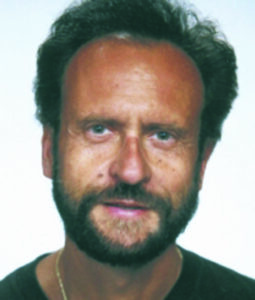Make me an Instrument of your Peace

by Victor Parachin
Living out the Prayer of St Francis
When Rev Russell Willoughby, minister of the historic Little Brown Church in the Los Angeles area, met with a family to plan a memorial service for a woman who had ended her life by suicide, he was told by the family that only a handful of people would attend. However, shortly before the service was to begin the church was packed to capacity by family members and friends of the deceased. During the service, the woman's brother spoke, saying his sister left behind a suicide note in which she stated: “There are only three people who really love me in the whole world.” As he read her words, there were audible gasps from many in attendance. No one seemed to realise she felt so unloved. Many began to weep as they reflected on how sad and lonely the woman had felt.
 Perhaps St. Francis of Assisi had someone in mind who was just like this woman when he included these words in his famous prayer: O Divine Master, grant that I may not so much seek...to be loved as to love.
Perhaps St. Francis of Assisi had someone in mind who was just like this woman when he included these words in his famous prayer: O Divine Master, grant that I may not so much seek...to be loved as to love.
This great saint was reminding people to seize every opportunity to speak and show love to people in their lives. To say “I love you” to another person may be the three-word antidote to the despair that a person may privately be struggling with.
St Francis is one of the most universally inspiring figures in history. His prayer, Make me an Instrument of your Peace, is read and loved by people worldwide. However, his prayer should not only be recited. It is a prayer which challenges us to move from thought to action. A good spiritual exercise is to review the sentences of his prayer and make them your own personal mission. Here are some ways to live out the prayer of St. Francis.
Where there is hatred, let me sow love...
 “The consciousness of loving and being loved brings a warmth and a richness to life that nothing else can bring,” wrote Oscar Wilde. One who witnessed this kind of love in action was the singer Tony Bennett. He was ten years old when his father, John Bendetto, died. Though he has few memories of his father, one stands out and has influenced Bennett all his life. His father, an Italian immigrant to America, operated a small grocery store in New York City. The family lived above the business. One evening they heard noise downstairs. A drunk man was attempting to break in, but was having a hard time doing it due to the alcohol. Benedetto crept downstairs and discovered the man unconscious. Evidently, he had tripped over some egg crates. The police were called and they explained that if Benedetto pressed charges, the man would be arrested and jailed. Letting out a sigh, Benedetto walked over to the man asking, “Do you have a job?” The man shook his head no, too embarrassed to speak. Then Benedetto told him: “Well, you have one now. You can work for me if you want to.” The man accepted the offer of employment immediately.
“The consciousness of loving and being loved brings a warmth and a richness to life that nothing else can bring,” wrote Oscar Wilde. One who witnessed this kind of love in action was the singer Tony Bennett. He was ten years old when his father, John Bendetto, died. Though he has few memories of his father, one stands out and has influenced Bennett all his life. His father, an Italian immigrant to America, operated a small grocery store in New York City. The family lived above the business. One evening they heard noise downstairs. A drunk man was attempting to break in, but was having a hard time doing it due to the alcohol. Benedetto crept downstairs and discovered the man unconscious. Evidently, he had tripped over some egg crates. The police were called and they explained that if Benedetto pressed charges, the man would be arrested and jailed. Letting out a sigh, Benedetto walked over to the man asking, “Do you have a job?” The man shook his head no, too embarrassed to speak. Then Benedetto told him: “Well, you have one now. You can work for me if you want to.” The man accepted the offer of employment immediately.
Thinking about that incident, Tony Bennett realised, “My father didn’t do it out of pity. He truly felt we had been blessed in America and were obliged to share our blessings with those who were less fortunate.”
Let his story inspire you to be the one who reaches out with love and compassion where there is hatred, distance, offence, malice, animosity, resentment.

St Francis
by Albert Chevallier Tayler 1898
Where there is injury, pardon...
This sentence can be connected to the biblical exhortation in Leviticus 19:18: “Do not seek revenge or bear a grudge ...but love your neighbour as yourself” (New International Version). Both the prayer and the biblical text challenge us to extend forgiveness and try to heal a damaged relationship. When we sincerely reach out and offer forgiveness, there are always beneficial and positive results.
In his book Eight Weeks To Optimum Health, physician author Andrew Weil MD, writes, “Regardless of the outcome, you will have demonstrated a willingness to repair a connection that was once important to you, and that willingness in itself is healthy. If you succeed, you will have regained a lost friend. If you do not succeed you will still have improved your well-being, because forgiveness benefits oneself, not just another. By forgiving, you can lessen your own emotional pain and experience increased inner peace, no matter what the response of the other person.”
Where there is doubt, faith...
Through your words and actions, help another person dream more, do more, learn more and become more. Many people experience times of self-doubt. Rather than go on, they give up. All it takes to prevent that from happening is someone to inject faith back into their lives by saying and showing “I believe in you.” Consider Lang Lang, the first Chinese pianist to be engaged by the Berlin Philharmonic and the Vienna Philharmonic. As a boy growing up in Shenyang, China, he fell in love with the piano and practiced six hours a day on a beat-up old piano, the only one his parents could afford. By the time he was eight, it was clear that for him to have a chance at success, he would have to study in Beijing, the nation's cultural capital. Because of his family's low income, Lang Lang began to doubt that his dream of becoming a concert pianist would ever come about.
However, his mother and father showed faith in their son when they decided to take a huge risk on his behalf. The mother remained in Shenyang to work and send money while father and son relocated to Beijing so he could train with higher level teachers. The only apartment they could find for the money they had was in an unheated building with five families sharing one bathroom. Because the music school was far from their apartment and because the bus fare was too expensive, Lang Lang's father ‘drove’ his son on his bicycle each day to and from school, an hour and a half each way. By the time Lang Lang was nine, he began winning competitions. As his skill developed, he received invitations world-wide, eventually playing with the Chicago Symphony and performing at the Lincoln Center and Carnegie Hall.
Where there is despair, hope...

St Francis of Assisi in Ecstasy
by Caravaggio c.1595
“Hope arouses as nothing else can arouse, a passion for the possible,” says author and minister Rev William Sloan Coffin. Wherever you see despair, inject hope. That is what Joanne did when she was asked to visit a woman in a psychiatric hospital who seemed to have neither family nor friends. Though hospital policy permitted only family to visit, the nurse in charge permitted Joanne to visit one time for ten minutes. The hospitalised woman's eyes exhibited great sadness and despair. When the time was up and as Joanne was preparing to leave she quietly and gently told the woman, “You are loved. You are a very special person, and God loves you.”
Once home, Joanne began to write regular notes of encouragement. “Just wanted to remind you today that God loves you,” was one. Into another she simply wrote out biblical verses of encouragement such as, “The Lord is close to the brokenhearted and saves those who are crushed in spirit” (Psalm 34:18). Joanne continued to pray for the woman. A year later, there was a knock at her front door. When Joanne opened the door, she did not recognise that it was the same woman she had visited in the psychiatric ward. This time her eyes glistened with joy and energy. The woman – ‘Anne’ - thanked Joanne for her visit and notes. Opening her purse, she removed a collection of the cards and letters Joanne had sent. “I want you to know that it was your letters that helped me get out of that hospital. I read them over and over again, until they sank deep into my mind and heart. They gave me hope when I had no hope.”
Where there is darkness, light...
This sentence from St Francis’ prayer should bring to mind the direct teaching of Jesus: “You are the light of the world ... let your light shine” (Matthew 5:14-16). There are so many who live in darkness -- the darkness of illness, of poverty, of loneliness and neglect. Let the light that you have shine into the dark places of life.
Journalist Arnold Fine tells of a powerful incident from his childhood days living in the Bronx, NY. He and a friend went to the home of a very poor woman who sold pretzels. The boys knocked on the door, and when there was no answer, they peered into a window where they saw the woman lying on the floor, apparently unconscious. Because the boys were not strong enough to break open the door, they asked a passing stranger to assist. The man broke open the door and when they all went inside, the house smelled of gas. They turned off the gas stove and opened all the windows. The woman soon revived.
However, it was clear to the two boys and the helping stranger that the woman lived in dire poverty. The man, noticing a book on her shelf, picked it up asking the woman, “Would you sell me this book. I'm a book dealer. I sell old books and I would be more than happy to give you $200 dollars.” The woman told him to take the book, without payment saying, “after all, you saved my life.” He responded saying it would not be fair for him to just take the book and reached into his wallet, giving her $200. Fine says they all left the house together but the man, late for an appointment, ran ahead of the boys. When he reached the corner, Fine saw the man pause, look at a garbage can and throw the book into it. It was only then that Fine and his youthful companion realised the man did not want nor need the book, but wanted to help the woman financially and without embarrassing her.
Where there is sadness joy...
A day before Christmas, Andrea became ill. She missed out entirely on her family's traditional Christmas eve meal. Her fiancé knew how disappointed she was, so as soon as she recovered, he attempted to re-create the family Christmas eve dinner just for the two of them. “The meal itself was pretty terrible,” Andrea recalls. “The meat was over-done, the potatoes were lumpy and the gravy was toxic but I gave my fiancé's sweet attempt four stars. I'll never forget that Christmas eve dinner because of his effort to bring me joy.”
Additionally, when seeking to live out the prayer of St. Francis, do not become concerned or discouraged about your ability to do this successfully. Be guided by this wisdom from Benedictine Sister Joan Chittister: “The question is not whether what we have to give is sufficient for the situation or not. The question is simply whether or not we have anything to give. That's what real hospitality is all about. Not abundance and not totality. Just sharing.”
 Entries(RSS)
Entries(RSS)